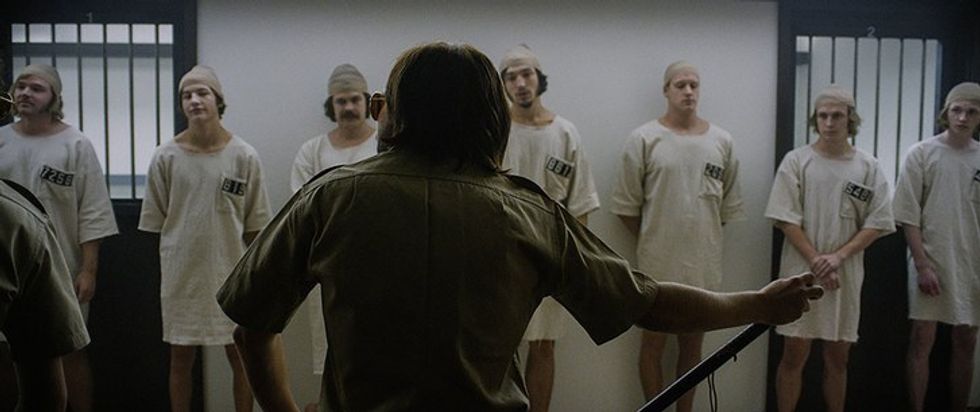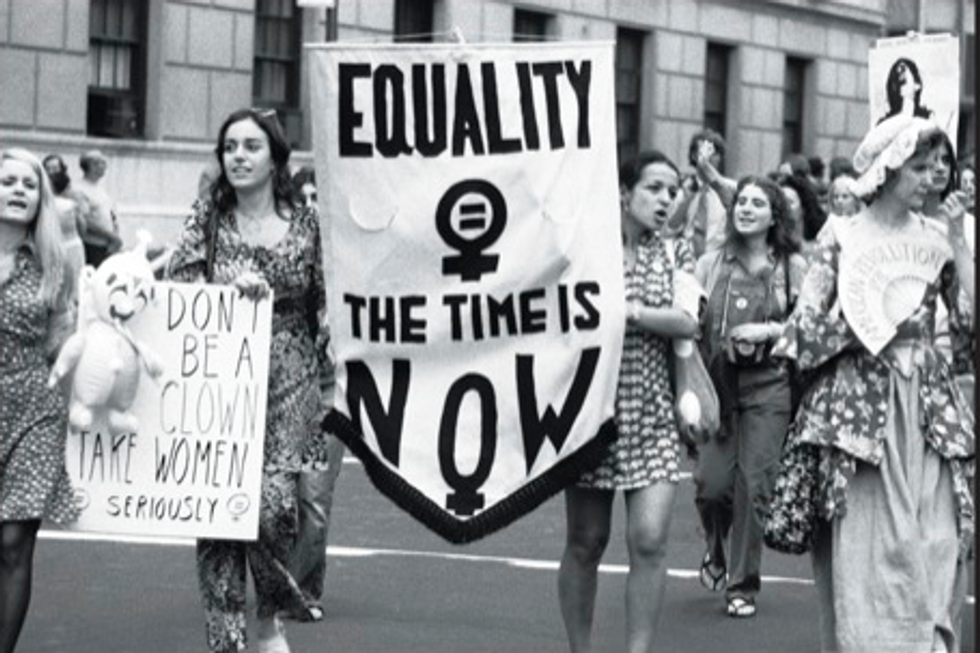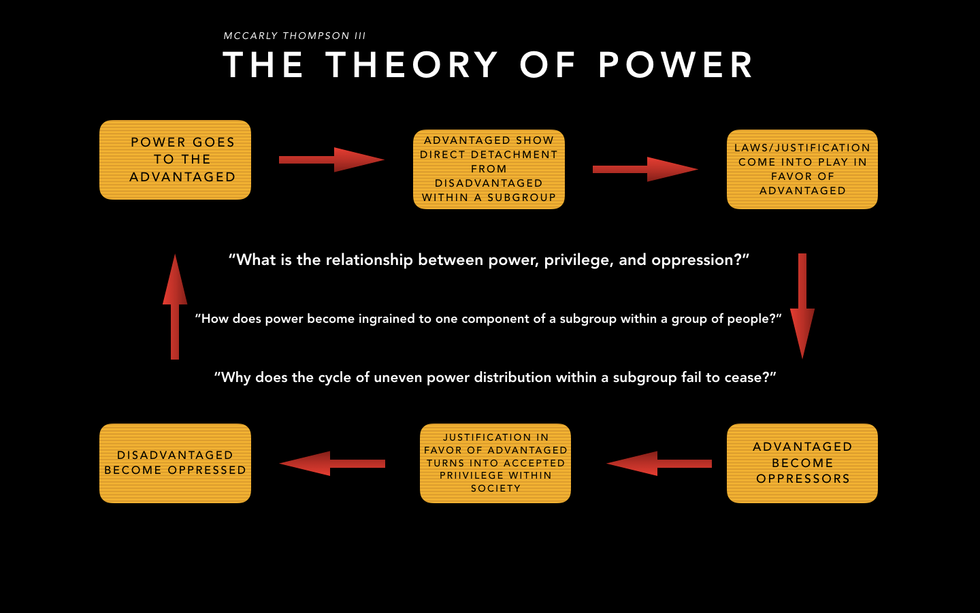A common element of American culture is separating people into distinct groups. We will call this "segmentation" for the sake of argument. These groups consist of citizens who possess commonly shared characteristics that make them distinct from a different group of Americans. The most popular groups in American society are defined by ethnic races, binary sexes, and social classes.
Within these particular groups, subgroups exist that segregate citizens even more. For example, within the gender division of America, the male and female gender exists, which are gender’s two subgroups. Now, despite the organizational benefits of having defined classes in America, some may argue that these classes do more to hurt subgroups than to help the group as a whole.
Power, privilege, and oppression: the three catalysts that galvanize the practice of segmentation throughout American history. These three components work off of each other to maintain the organization of a particular group, which have increasingly negative effects on their subgroups as time goes on. In both classical and contemporary time, power is controlled by those that are grandfathered into a lifestyle of receiving advantages over their “inferiors”.
According to American behaviorist, Philip Zimbardo, “when a person receives an excess amount of power he or she is inclined to letting that power corrupt their mind” (Zimbardo, 1971). This is especially true in the world of business, where you will find CEOs of corrupt companies letting their personas get to their heads as they mentally intimidate their employees. Nevertheless, businessmen such as Steve jobs and others never get scolded for the poor treatment of their employees because it is the status quo for CEOs to have bolstered egos. Because they’ve “earned that privilege”.
Former staff correspondent at National Journal and producer of The Atlantic’s National channel, Brian Resnick published an article on power named "How Power Corrupts The Mind", in which he states, “Power lends the holder many benefits. [Powerful people] downplay risks, and enjoy higher levels of testosterone (a dominance hormone), and lower levels of cortisol (a stress hormone)” (Resnick, 2013). This quote shows readers how power literally has the ability to change a person’s psychological wellness, causing them to naturally be more aggressive towards others, vicariously intimidating and condescending them.
In cases like this, social prejudices and injustices develop in communities of a diverse class structure. This is most apparent when analyzing slavery in the eighteenth and nineteenth century. Since both federal and state governments gave slave-owning nationalists the rightful power to capture, own, trade, sell, beat, and/or kill their African slaves in the United States, nationalism soon became an amplified version of racism. Although social tensions between whites and blacks have been defused since pre-civil war times, social problems such as police brutality, racial profiling, workplace discrimination, and mass incarceration still exist to this day.
Privilege is the result of power being covertly institutionalized for one specific group or subgroup. Privilege allows the superior group to live in a way that is desirable, yet unachievable for the inferior group, no matter the laws, politics, or economics. We see this in life most evidently in the case of “white [male] privilege”.
An extreme case of this phenomenon alive in history dates way back to the 1950s when white GI veterans were offered newly built homes after returning from war, the same houses that were denied to their black counterparts. Even though whites and blacks fought in interracial divisions in World War II, blacks were still considerable unequal to whites by landowners and real estate agents. In the PBS endorsed documentary, “Race - the Power of an Illusion”, we learn that blacks were forced to live in “vertical ghettos”, where crime was bound to happen, and whites were gradually inhabiting utopian “suburbias” (California Newsreel, 2003).
Since the practice of only leasing and selling property to white families was accepted in society, blacks were forced to move into these so-called ghettos and assume the role of inner-city “gangsters”, “drug addicts”, and “criminals”. Simultaneously, a national schema of the modern, successful, American family was slowly being created. Anyone who was not living the new American lifestyle in the mid-late 1950s was just different to everyone “else”. And once again, just like power, we see privilege corrupting a person’s mind.
Once we examine power and privilege as two comparable elements, we can draw the conclusion that power is the struggle between the privileged and the oppressed. The oppressed are the disadvantaged within a subgroup, making the privileged those who have the advantages within the subgroup. Social oppression is known as “the concept that describes a relationship of dominance and subordination between categories of peoples in which one benefits from the systematic abuse, exploitation, and injustice directed toward the other”, according to writer Ashley Crossman, highlighting the power struggle in favor of the privileged (Crossman, 2017). In this case, we see the advantaged player within a subgroup constantly getting the upper hand over the disadvantaged player within that subgroup due to customs, norms, and roles within the group.
One of the most tangible examples of oppression within gender grouping comes from the relationship between men and women in society. For example, American women are treated significantly unfairly in comparison to when politics and economics are a factor. Women were not able to vote in this country until 1920, while men were able to vote since 1870 when the 15th amendment was passed. On top of that, women are still receiving only 79 cents for every dollar a man earns, which makes their annual earnings approximately $10,800 less than their male counterparts, even 54 years after the Equal Pay Act was passed by the Federal Government (Business Insider, 2017).
This statistic allows us to see the malpractice of oppression in everyday life. Although women do the same jobs for the same hours as a man, the two subgroups receive substantially different earnings for their efforts, despite what laws are in play to protect women. This is a common theme of America’s contradictory Declaration of Independence.
When viewing power, privilege, and oppression through an objective lens, we must consider how this phenomenon is good and bad for a society. As it creates roles, promotes culture, and maintains order within a society, the means of the power phenomenon are not always ethical. As the advantaged move up in society, the disadvantaged move down...the main emphasis of Social Darwinism. When this happens, the gap between the different players within a subgroup becomes larger, calling for increased segmentation, xenophobia, discrimination, and systematic hatred.























